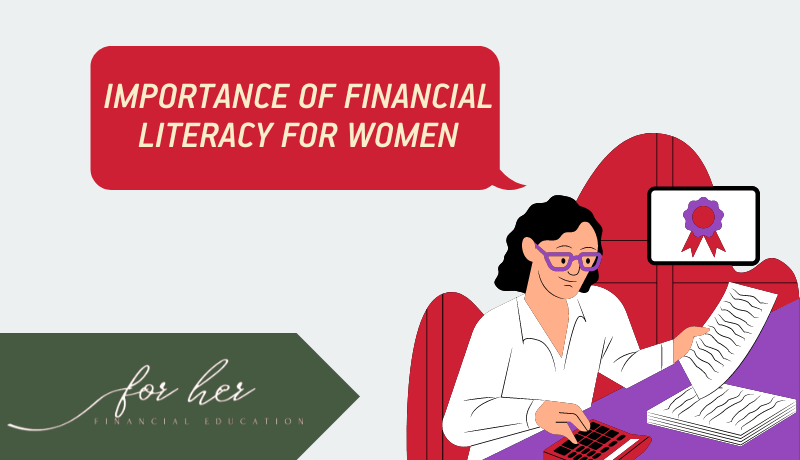Quite simply, knowledge is power. So, too, is financial literacy power. Financial literacy is the capacity to comprehend and manage personal finances and is a skill that every woman should have. It is the cognitive understanding of financial components and skills, such as budgeting, investing, borrowing, taxation and personal financial management. Financial literacy is critical to a person’s financial well-being, and its value cannot be emphasized enough. Being financially literate allows an individual to be better prepared for specific financial roadblocks which, in turn, decrease the chances of personal economic distress.
Financial literacy is the foundation of your relationship with money, and it is a lifelong journey of learning. The earlier you start, the better off you will be. Unfortunately, women in India still often have limited financial knowledge. Financial literacy is important for so many reasons, as follows:
- People who understand personal finance better are more likely to make sound financial judgements and decisions.
- If you are financially literate, you are less likely to buy on impulse or incur unneeded debt.
- You are more likely to save money and put money aside for the future.
- When you are financially literate, you are typically better able to understand and manage debt.
- You are better able to construct a sound retirement plan that matches your needs.
- Individuals that are financially literate are better able to understand financial markets thus helping to prevent costly mistakes.
- You are more likely to identify and avoid financial frauds if you are financially literate.
- Financial knowledge fosters financial security and stability. So, by better understanding personal finance, you are better able to make educated judgements about debt, retirement, and investment opportunities, among others, all of which contribute to financial stability and security.
- You are better equipped to reach your financial goals.
- You should have less financial stress and anxiety if you are financially literate.
When it comes to money matters, what you don’t know can, indeed, hurt you because the lack of knowledge can affect everything from how much you save, to how much debt you take on and under what terms. Numerous financial decisions can face you before you even reach adulthood or soon after, including things like how to pay for college, managing a credit card, taking out a car loan, boosting your credit score, paying taxes, and starting to save for retirement. Of course, you are more likely to make better decisions when you are financially literate. The higher your financial literacy, the less daunting making major financial decisions should be.
There is always something new to learn when it comes to personal finances, and there is no wrong time to improve your financial literacy. The more financially literate you become, the more it can help you take actions that ultimately bring you closer to a state of financial well-being. Indeed, the greater your financial literacy, the better your chance to manage money with greater ease and less stress. You will also potentially be more prepared for when life takes unexpected turns and may be able to more easily identify the financial opportunities that best suit your needs. Plus, being financially literate gives you a better chance at being able to recognize warning signs for predatory businesses or lenders.
Making financial literacy a lifelong pursuit should be a priority as the world of personal finance is ever evolving and staying informed helps keep you on a path to financial well-being. For women, it is even more important to normalize conversations about money and educate ourselves about finance. Women need to build a healthy relationship with money, and, without financial literacy, we become stuck in cycles that limit our growth opportunities and does the same for future generations. If we don’t increase our financial literacy, we run the risk of facing serious repercussions, such as taking on large amounts of credit card debt, defaulting on student loans, and experiencing difficulty managing income, taxes and investments. Financial literacy can equate to a lifetime of chronic stress.
Another key reason why financial literacy is important is that a recent report from the Economic Abuse and the Importance of Financial Literacy for Women by Rights of Equality, published on March 26, 2023, found that improvements in women’s financial literacy can significantly reduce the rates of violence against women perpetrated by their male partners. Indeed, financial insecurity is a main reason why women have trouble leaving abusive relationships and why they return to them. We have a high risk of falling into poverty because of divorce, and we also tend to outlive men, so our retirement funds need to last longer. In India, most women prioritize things like our family and paying off debt over saving for retirement. The following are some ways to improve your financial literacy:
- Stay updated with the latest financial news and trends by subscribing to reputable financial news sources, reading financial publications, and following reliable financial websites and blogs to stay updated with the latest information
- Educate yourself on different investment options. It’s essential to understand the different types of investments, their risks and returns, and how they fit into your overall investment strategy. Take the time to research and learn about different investment options and their pros and cons.
- Understand risk management, which is a critical aspect of investing. Start by better understanding of diversification, asset allocation and risk/reward trade-offs.
- Develop a well-structured financial plan that defines clear financial goals, develop a budget, and create a roadmap to achieve your goals.
- Learn about tax planning as tax planning strategies can both help minimize tax liabilities and optimize investment returns. Be familiar with different tax-advantaged accounts, like retirement and education savings accounts, and stay up to date on changes in tax laws and regulations that may impact your investments.
- Be cautious of financial scams and skeptical of investment opportunities that promise high returns with little or no risk.
- Improve your financial literacy through continuing education, as there is always more to learn. Invest in your financial education by attending seminars, webinars, taking online courses, reading financial books and articles, and engaging with your financial community.
- Lastly, it’s essential to track your investments and review your portfolio periodically to ensure you stay on track and make the necessary adjustments.
With an increasing number of women in the workforce, financial literacy for women is more important than ever. Not only can being financially illiterate contribute to a host of problems, like debt burden, poor spending habits or lack of long-term financial planning, but financial literacy is an extremely important component of independence because it empowers women. The more financially literate you are, the better prepared you are for emergencies and to deal with the rising costs of living and inflation. In most Indian households, women are responsible for the day-to-day expenses so the more you know how to best use your money, the better your position will be. Children also tend to be highly influenced by their mothers so being financially literate sets a very good example and precedent. Because women live longer than men, financial literacy will better enable you to carry on with your day-to-day affairs and to independently manage your finances when the time comes. The sooner you start, the more confident you will become in making your own decisions and managing your own finances. By increasing your financial literacy, you are in a better place to achieve your life and career goals more effectively. There is no better time than the present to enhance your financial literacy!
An Investor education and Awareness initiative of Aditya Birla Sun Life Mutual Fund
All investors have to go through a one-time KYC (Know Your Customer) process. Investors to invest only with SEBI registered Mutual Funds. For further information on KYC, list of SEBI registered Mutual Funds and redressal of complaints including details about SEBI SCORES portal, visit link : https://mutualfund.adityabirlacapital.com/Investor-Education/education/kyc-and-redressal for further details.
Mutual Fund investments are subject to market risks, read all scheme related documents carefully







 1800-270-7000
1800-270-7000










